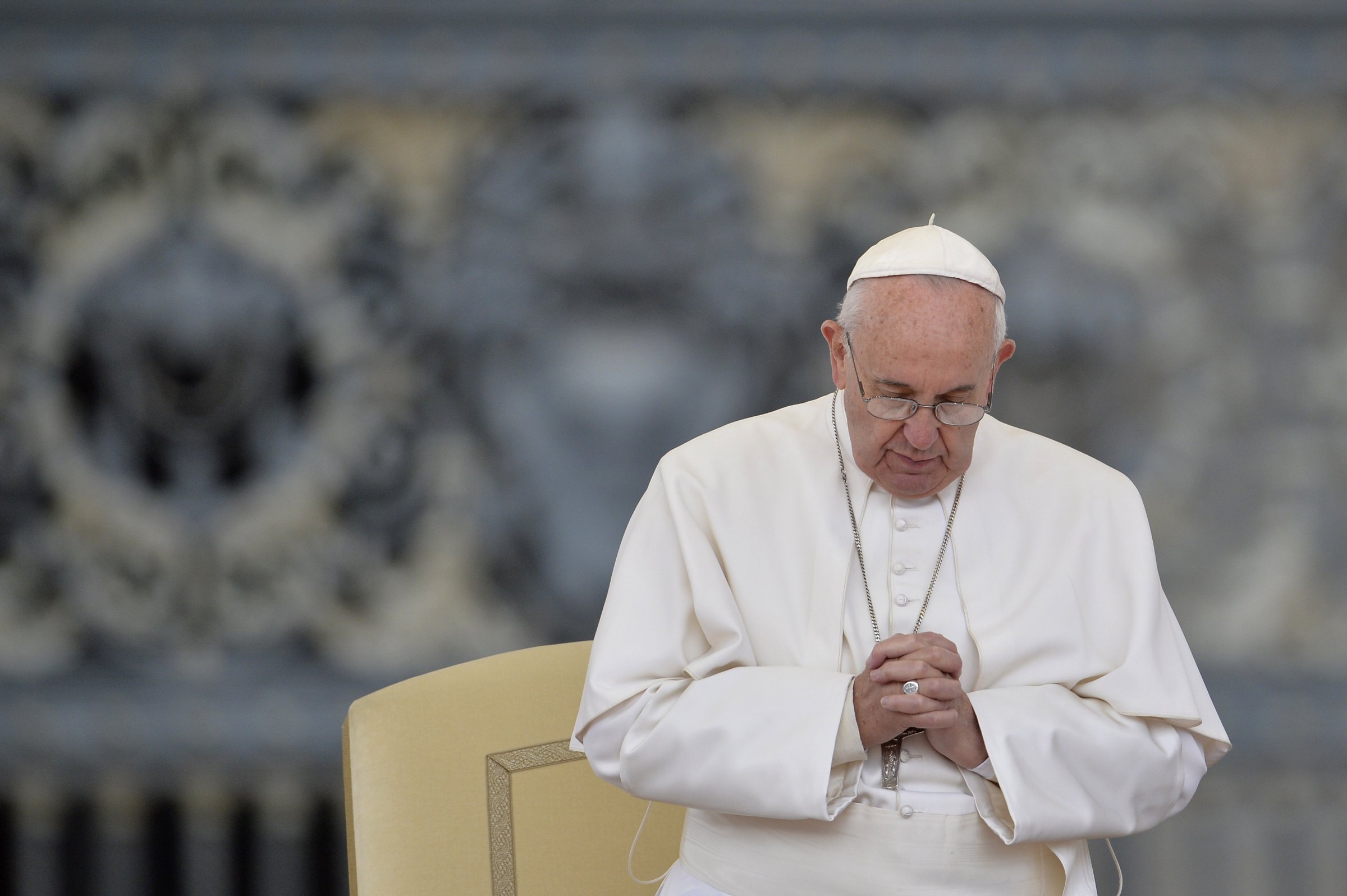
A small firestorm broke out on Wednesday as word got out that Pope Francis had a previously undisclosed meeting with Kim Davis, the Kentucky country clerk who refused to issue same-sex marriage licenses. Francis’s decision to meet with Davis was understandably upsetting to many in the LGBT community, particularly in a week where Francis called on bishops to not wade into every culture war.
But before being too critical of Francis, we should put this event in context. For six days, Pope Francis’s words and deeds transfixed our nation. He spoke boldly to our nation’s leaders about God’s particular love for the excluded. He ate lunch with the homeless, sang songs with immigrant children, and told prisoners that God’s mercy was boundless. A brief private meeting with Kim Davis doesn’t change that. As Jesuit priest Fr. James Martin put perfectly, “Pope Francis also met Mark Wahlberg, and that does not mean that he liked Ted.”
The pope has said before that he wants to encounter all people:
I like to meet everyone. Because first and foremost I think every person is a child of God, with rights. Second, because meeting another person is enriching. Yes, I would like to meet with them.
This can cause trouble sometimes. Conservatives were upset when the White House invited LGBT Catholics to the pope’s arrival ceremony, and others were frustrated that a gay man was chosen to be a lector at his Mass at Madison Square Garden.
This doesn’t seem to bother Francis too much. The word “pope” derives from the Latin pontifex, which means “bridge builder.” From the beginning of his pontificate, Francis has embodied this radical understanding of the papacy.
A common refrain on social media today is that retweets don’t equal endorsements. Can the same be said of the Bishop of Rome? The pope encounters thousands of men and women every year, but surely those meetings aren’t endorsements of every action those individuals take?
Meeting privately with Kim Davis is controversial, but keep in mind that this is a pope whose public and private meetings have included everyone from prisoners to Vladimir Putin to Fidel Castro.
And while he met with Kim Davis, he also met with some undeniable American heroes, including Sister Donna Markham, who runs Catholic Charities USA; Sister Mary Scullion, who has dedicated her lives to the poor in Philadelphia; and Sister Norma Pimentel, who ministers to immigrants at the border.
The pope’s advisors made a questionable decision to have Francis meet with Davis. After Judge David Bunning put Davis in jail, conservatives hailed Kim Davis as a modern-day St. Paul.
But let’s set the record straight: Kim Davis is no St. Paul, and unlike Dorothy Day and Martin Luther King—two authentic conscientious objectors that Francis lifted up in his trip to the U.S.—Davis didn’t practice moral heroism by refusing to step down as country clerk. While King and Day opted out of the system they morally disagreed with, Davis still receives a paycheck from the American people.
This is an important moment for the Francis Effect on the American people. We can get caught in the details of who Francis visited and didn’t visit and what Francis said and didn’t say, or we can reflect on the trip in its entirety.
Francis shared his hopeful, inclusive vision for a nation that continues to be a “a land of dreams. Dreams which lead to action, to participation, to commitment. Dreams which awaken what is deepest and truest in the life of a people.” If reinvigorating these dreams is indeed the goal, the way forward is just as clear: As Pope Francis has said, “If we want security, let us give security; if we want life, let us give life; if we want opportunities, let us provide opportunities.”
This great vision and challenge—not a brief politicized moment—will be the lasting legacy of Francis’s journey to the U.S. When Jorge Mario Bergoglio was elected pope in March 2013, the pundits said he brought forth the Francis Revolution to the Catholic Church. If the American people do their part, we can make sure that revolution crosses the Atlantic and transforms our nation into that which Francis—and Jesus Christ himself—longs for it to be: a place where no one is excluded, and no one is left behind.
More Must-Reads from TIME
- Inside Elon Musk’s War on Washington
- Meet the 2025 Women of the Year
- The Harsh Truth About Disability Inclusion
- Why Do More Young Adults Have Cancer?
- Colman Domingo Leads With Radical Love
- How to Get Better at Doing Things Alone
- Cecily Strong on Goober the Clown
- Column: The Rise of America’s Broligarchy
Contact us at letters@time.com